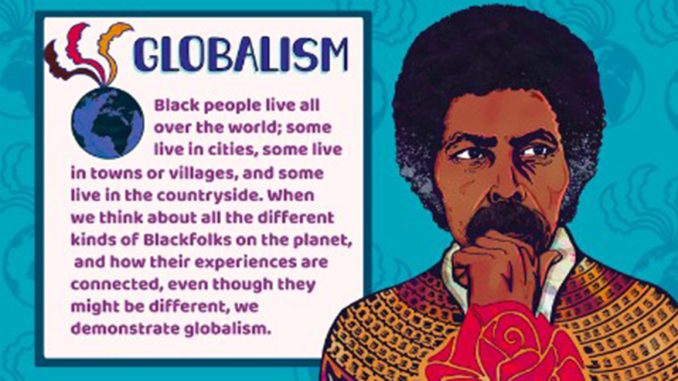
Observances of Black Lives Matter at School Week across the country included lessons on unconscious racial bias, globalism, and so-called microaggressions developed by far-left groups such as the Southern Poverty Law Center and the Howard Zinn Education Project.
D.C. Area Educators for Social Justice this week approvingly cited numerous examples in Hayward, California; Lawrence, Kansas; and throughout the D.C. area.
The Hayward Unified School District in California taught students about “structural racism, black history, and anti-racist movements” during the Feb 6-10 “Week of Action.” The Week of Action promotes Black Lives Matter’s 13 guiding principles to elementary-, middle-, and high school students, including “restorative justice,” “queer affirmation,” and “trans affirmation.”
Teachers at Hayward schools studied Rethinking Schools’ “Teaching for Black Lives” book and reached conclusions such as “There is a history in this country of white men killing unarmed black men with little to no consequence,” according to a “Teaching for Black Lives” core text reflection document circulated by the school district.
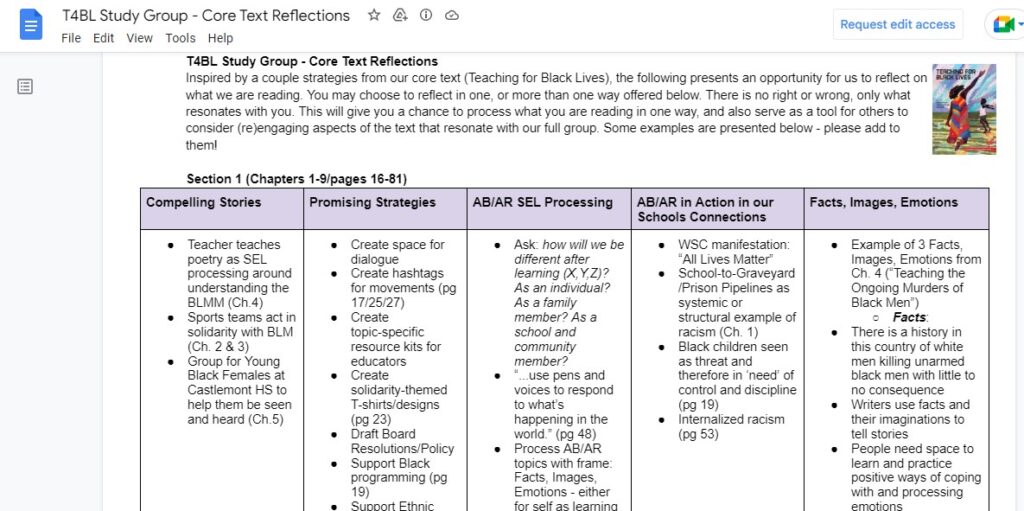
Rethinking Schools is the co-coordinator of the Zinn Education Project, which advances the work of the now-deceased Howard Zinn, the communist author of “A People’s History of the United States.” The book has been criticized for its historical inaccuracies and distortions of facts.
The district posted a list of educator resources, including Black Lives Matter at School’s 13 guiding principles; a reading list from Social Justice Books; and information on “microaggressions,” as what it calls “the new hate language.” Other recommendations include articles from Learning for Justice on Identifying Unconscious Bias and the Do’s and Don’ts of Teaching Black History.
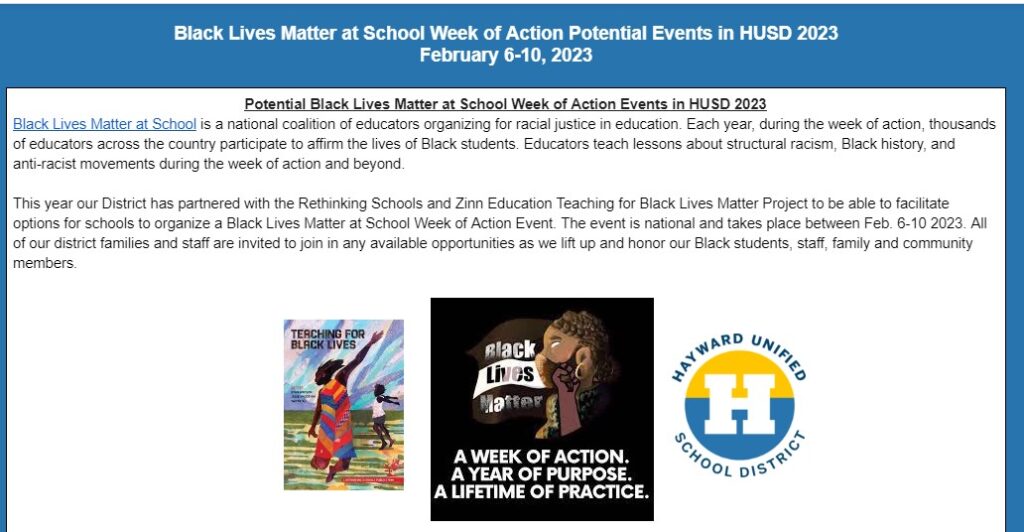
Learning for Justice is the education arm of the leftist Southern Poverty Law Center, which is known for branding conservative and Christian organizations as “hate groups,” placing them on a “hate map” alongside Ku Klux Klan chapters.
Hayward schools distributed a template to help teachers organize Black Lives Matter at School programming based on the school’s racial environment. The form asks for a rating of the organization’s readiness for Black Lives Matter at School Week on a scale of 1 to 10.
A score of one denotes “We are collectively unprepared to talk about racial biases, let alone Black Lives Matter,” while 10 signifies “We have an active organization dedicated to racial equity that has been successful in creating and sustaining movements.”
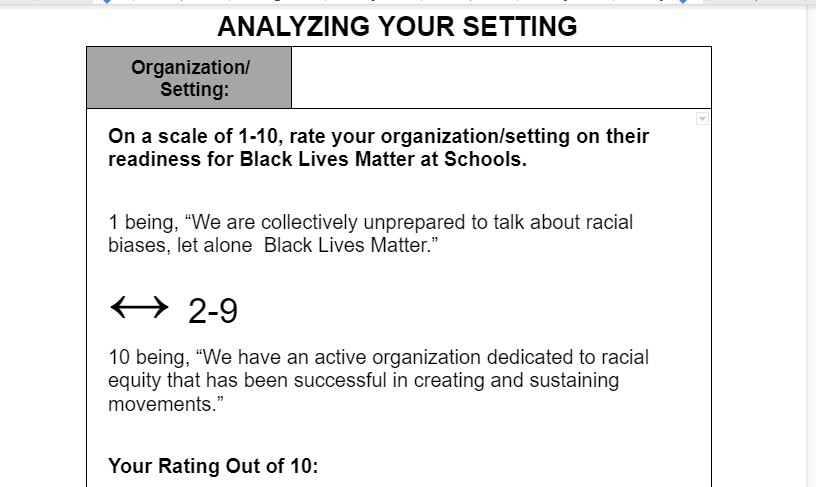
The theme of the week for the Hayward Unified School District was “Unapologetically Black.”
“Unapologetically Black is the affirmation that Black Lives Matter and that our love and desire for justice and freedom are prerequisites for wanting the same for others,” read an email sent to some district employees from Candace Cofield, who works in the district’s equity department. “These principles will not be compromised in an effort to eliminate the discomfort that comes with dealing with race.”
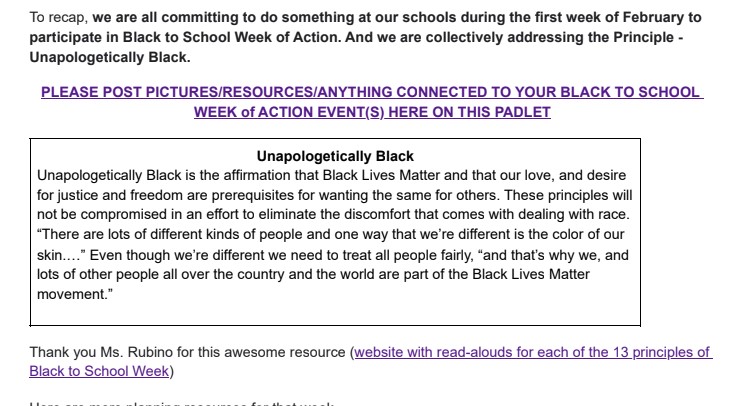
Meanwhile, an elementary school in Lawrence, Kansas, posted prompts and book recommendations for elementary schoolers for the Week of Action on a Google Slides Presentation.
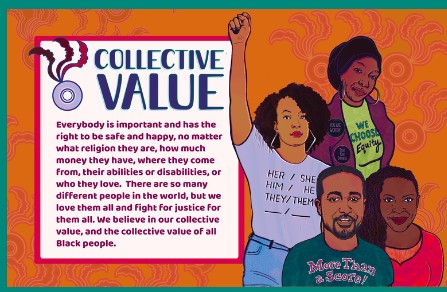
Each day of the week, children studied Black Lives Matter’s purposes through discussion questions such as “How do you feel when someone else tells you what ‘girls should do’ or what ‘boys should do’?” and “What are things that you can do to stand up for equity in your school and community?”
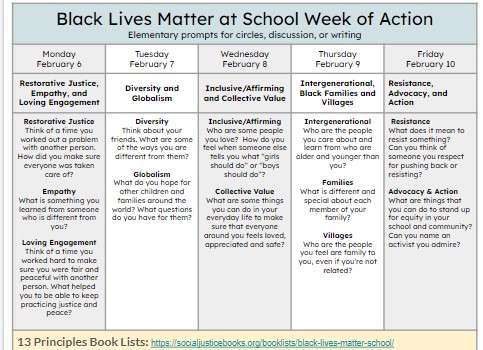
One day’s lesson included book recommendations, such as “I Want To Be a Vase” about a toilet plunger that wishes to defy his shape and become a vase; “Except When They Don’t,” a book against gender stereotypes in toys, published in partnership with GLAAD to promote LGBT inclusion, according to a description from its publisher Simon & Schuster; and “Neither” about a creature that isn’t sure if he is a bird or a bunny.
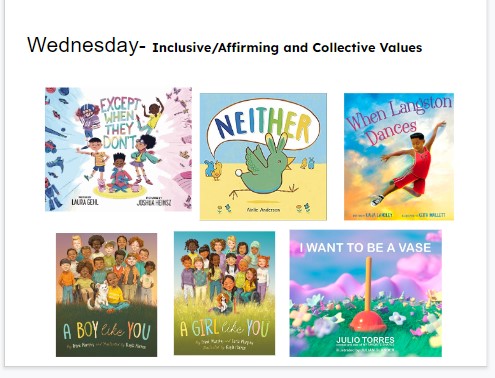
Another slide gives an elementary-school-friendly definition of “restorative justice.”
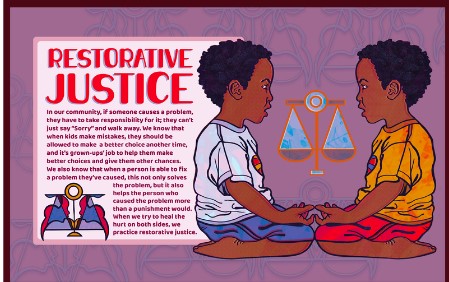
At the end of the week, kindergarten through fifth grade students participated in a Black Lives Matter at School march.
Lawrence Public Schools have a history of woke curriculums. On June 2, 2020, Superintendent Anthony Lewis published a statement promoting “racial equity” citing “the consequences of social injustice and systemic racism that permeate the societal fabric of our nation.”
Neither school district responded to The Daily Signal’s request for comment.
Numerous schools in the D.C. area also observed Black Lives Matter at School Week, including Freedom High School in Woodbridge, Virginia, and Hayfield Secondary School in Alexandria, Virginia.
“Using the Black Panther Party as a primary focal point, students explored ‘Community as Resistance,’” according to the D.C. Area Educators for Social Justice’s description of the week’s events at the Alexandria high school.
Two Rivers Middle School in the District of Columbia did a “mass incarceration mini unit” developed by The 1619 Project, a New York Times project that aimed to “reframe” American history to put the “consequences of slavery and the contributions of black Americans at the very center of our national narrative.”
The D.C. Area Educators for Social Justice celebrated the widespread observation of the BLM at School Week of Action.
“Gearing up for the Black Lives Matter at School Week of Action is no small feat,” a website post says. “While many educators in the D.C. area have been uplifting Black Lives Matter at School work with participation in the Year of Purpose, the Week of Action is a focused opportunity to uplift the guiding principles and national demands.”
Have an opinion about this article? To sound off, please email letters@DailySignal.com, and we’ll consider publishing your edited remarks in our regular “We Hear You” feature. Remember to include the URL or headline of the article plus your name and town and/or state.

